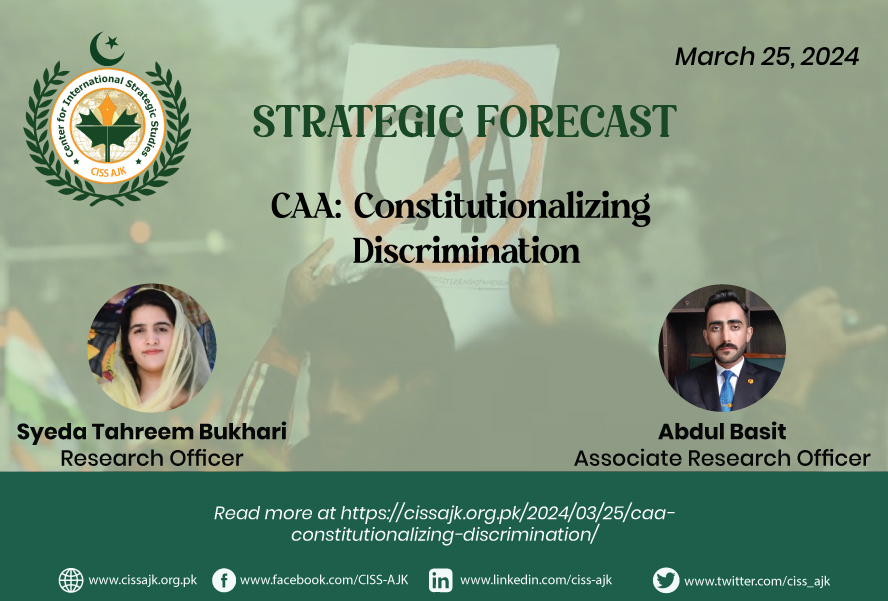The implementation of the CAA law after four years being ratified in December 2019, introduces expedited citizenship pathways for persecuted minorities originating from neighboring nations, encompassing Hindus, Sikhs, Buddhists, Jains, Parsis, and Christians, who sought refuge in India prior to December 31, 2014. Indian Citizenship Amendment Act, has been projected as providing shelter to those escaping religious persecution in their respective countries by Indian government. However, its clauses are contradictory not only to Universal Declaration of Human Rights but also to its constitutional values. UDHR defines citizenship or nationality as the essential link between an individual and the State. Every person has the right to nationality under the Article 15 of the UDHR. Article 14 of the Indian constitution also grants every person right to equality and equal protection of laws within territory of India. CAA violates both the Constitution and UDHR of whom India is a signatory.
The CAA discriminates against people on religious basis by including some of the religious groups such as Hindus, Sikhs, Buddhists, Jains, Parsis, and Christians from Afghanistan, Bangladesh, and Pakistan. While, Muslims constitute 14.2% of Indian population, along with the Jews, numbering around 7000 and the Baha’i of whom 40% of the total population residing in India are excluded under this bigoted law. The religious minorities from Tibet, Sri Lanka, and Myanmar have no protection under the Citizenship Amendment Act. Furthermore, the minorities to whom the citizenship offer is extended under CAA faces discrimination on ethnic basis. For instance, in the case of persecuted Parsis, the disparity in citizenship tenure between Afghan and Iranian Parsis – six years and eleven years respectively – serves as a stark illustration of the CAA’s inadequacy in safeguarding minority interests, instead perpetuating a veneer of societal harmony within India. Same is the case with other marginal groups and their origins. Nonetheless, the conspicuous exclusion of Muslims and specific minority factions, coupled with the selective timeframe for eligibility, has prompted scrutiny into the underlying motives guiding the legislation.
If the purpose is to facilitate the minorities from their persecution in respective countries, then it should not discriminate among them on basis of religion, state, and ethnicity. This raises concerns regarding the hidden objectives that ruling government aims to secure. The implementation of the CAA emerges as a strategic tool wielded by the Bharatiya Janata Party (BJP) to advance its political agenda, intricately intertwined with its Akhand Bharat slant. The timing of implementation of CAA just before the upcoming elections highlights Modi’s attempt to secure domestic vote bank. Furthermore, BJP is implementing Hindutva ideology to pursue its goal of converting India into pan-Hindu state through such bigoted law that would pit Hindus against Muslims, deepening the communal divide.
The significant difficulties in the registration process are notably highlighted by the experiences of Bengalis and Rohingya residing in Assam. Approximately 2 million people were excluded from the National Register of Citizens due to their failure to provide evidence of citizenship. Moreover, the inherent inconsistencies within the registration process, characterized by the arbitrary exclusion and inclusion of family members, exacerbate the plight of marginalized communities.
More than 200 million Muslims in India fear that they would be rendered stateless through this discriminatory law in near future, combined with policies of Hindu majoritarian government. Human Rights Watch has raised concerns on discriminatory nature of Citizenship Amendment Act and has demanded that the Indian government should protect all groups at risk regardless of religion. It further accentuates the discriminatory underpinnings of the CAA. Thereby underscoring the BJP’s prioritization of electoral dividends over the holistic welfare and integration of minority factions within the Indian sociopolitical landscape.
While India claims that the purpose behind CAA is to provide shelter to minorities escaping religious persecution in respective countries, the situation appears different. The United State Commission on International Religious Freedom has continuously recommended India as a ‘Country of Particular Concern,’ for the past four years. The BBC documentary also revealed that the individual advocating for providing shelter to minorities under the umbrella of the CAA was the former Chief Minister of Gujarat, who is accused of orchestrating the genocide of Muslims. Under the Modi regime, the persecuted Christians of India still suffer following the outbreak of violence in Manipur since last year. The 2019 report on International Religious Freedom by US sheds light on how religious intolerance has increased under Modi regime. The report divulged the practice of violence, intimidation and harassment by the Hindutva groups against the Muslims and low caste Dalits, aiming to establish a religion based national identity for India. Furthermore, a substantial number of Muslim individuals have been mob lynched by cow vigilantes amid intensifying islamophobia among Hindus.
The CAA is another attempt by India to create division among people by engaging them in hate politics turning India into Pan-Hindu State. The deliberate omission of diverse ethnic and religious groups, alongside the evident disparity in the citizenship registration period, underscores the BJP’s overarching objective of securing political advantage rather than addressing the legitimate concerns of marginalized communities.
Bio
Syeda Tahreem Bukhari is Research Officer at Center for International Strategic Studies, AJK
Abdul Basit is Associate Research Officer at Center for International Strategic Studies, AJK


